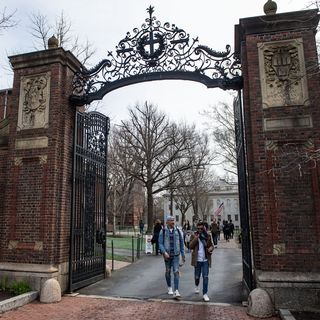Normal view
Why Kilmar Garcia's Wife Says She Was 'Afraid' of Him, Feared for Her Child
White House plan would eliminate Head Start, make sweeping health cuts
A Trump administration budget proposal calls for eliminating programs like Head Start, funding for community mental health clinics and initiatives aimed at preventing teen pregnancy in fiscal 2026.
Why it matters: The 64-page document, called a budget passback, reveals the breadth and deep extent to which the Trump administration is eyeing cuts to the federal health bureaucracy.
- The Office of Management and Budget document is just a proposal but offers a preview of what President Trump's spending priorities are. Congress has the final say in how discretionary funds are allocated.
- The document was first reported by the Washington Post.
Zoom in: The proposal calls for about $20 billion appropriated to a new agency within Health and Human Services called the Administration for a Healthy America. HHS Secretary Robert F. Kennedy Jr. announced last month that he planned to combine several existing agencies into this new entity.
- The document also requests $500 million to be allocated by the HHS secretary for activities that support the administration's so-called "Make America Healthy Again" initiative, per the document.
In all, about $40 billion, or one-third of the HHS discretionary budget, would be cut under the proposal compared with fiscal 2024 levels.
- The document suggests eliminating programs for rural health care providers, HIV treatment efforts, health care workforce initiatives and childhood lead poisoning. It does not say whether or how the work done by these programs would continue.
- Some offices that the document suggests could be eliminated, including the Administration for Preparedness and Response, have existing legal authorities, with officials confirmed by the Senate.
Reality check: No final funding decisions have been made yet, OMB communications director Rachel Cauley told Axios.
Zoom out: There had been earlier reports that Head Start, a storied program created as part of President Johnson's War on Poverty, was on the chopping block.
- That was an aim of Project 2025.
- Ending the program, which provides early childhood education, nutrition and health care help to nearly 800,000 kids and their families, would have "catastrophic" consequences for some of the poorest people in the U.S. — with outsized impacts in rural communities.
- "I had a very inspiring tour [of a Head Start program]," Kennedy said last month. "I saw a devoted staff and a lot of happy children. They are getting the kind of education and socialization they need, and they are also getting a couple of meals a day."
Go deeper: Advocates worry over possible cuts to Head Start


Trump admin asks IRS to rescind Harvard's tax-exempt status
The Trump administration asked the Internal Revenue Service to rescind Harvard's tax-exempt status, multiple outlets reported Wednesday, citing anonymous sources.
Why it matters: The Trump administration is escalating its retaliation against the Ivy League university after it refused to comply with the administration's list of demands.
Catch up quick: It cut $2.2 billion in grants and $60 million in contracts to Harvard.
Driving the news: Trump on Tuesday said on Truth Social that Harvard should "lose its tax exempt status and be taxed as a political entity."
- He said the university was pushing politics and ideology.
- "Tax exempt status is totally contingent on acting in the public interest," he wrote.
Zoom out: The majority of public and private universities and colleges are tax-exempt entities because of their educational purposes or because they're state governmental entities, according to the Association of American Universities.
- The federal government has recognized the educational mission "as fundamental to fostering the productive and civic capacity of its citizens."
Go deeper: How Trump wants to assert control at Harvard and elite colleges


Judge warns "probable cause exists" to hold Trump in contempt over deportation flights
A federal judge said Wednesday that he has found probable cause to hold the Trump administration in contempt for defying his order to halt deportation flights of alleged Venezuelan gang members to El Salvador.
Why it matters: The Trump administration's defiance of U.S. District Judge James Boasberg's order last month has sparked a high-stakes legal battle that could test the limits of President Trump's deportation powers.
- It has also proven to be a political lightning rod, with both administration officials and Democratic lawmakers visiting the infamous El Salvadoran mega-prison where the migrants are being sent.
The big picture: The Trump administration's decision to proceed with the deportation flights displayed a "willful disregard" for the order, Boasberg wrote in a ruling Wednesday.
- The administration has defended its decision to follow through with the deportations under the Alien Enemies Act of 1789, arguing the planes were already in international waters at the time and the ruling did not apply.
- This reasoning, Boasberg noted, "requires ignoring the clear context in which the Order was issued."
Zoom in: Boasberg wrote that the Trump administration had been given "ample opportunity to rectify or explain their actions. None of their responses has been satisfactory."
- "Probable cause exists to find the Government in criminal contempt," he added.
The other side: White House communications director Steven Cheung wrote on X Wednesday that the Trump administration plans "to seek immediate appellate relief."
- "The President is 100% committed to ensuring that terrorists and criminal illegal migrants are no longer a threat to Americans and their communities across the country," Cheung added.
Zoom out: Last month, Trump invoked an 18th-century wartime authority to justify the deportation of some 250 Venezuelan migrants it accused of being members of the Tren de Aragua gang.
- The migrants were subsequently transferred to El Salvador's Center for Terrorism Confinement (CECOT), where Boasberg has warned they are likely to suffer "significant harm."
- Meanwhile, Republicans have targeted Boasberg for impeachment for attempting to block the deportations.
What we're watching: Boasberg said he would allow the court to attempt to rectify its violation voluntarily. If they fail to do so, the court will try to determine which officials are responsible for the order's violation.
- The court would then request the Justice Department to prosecute the responsible individuals.
- If the administration "declines" to do so, "the Court will 'appoint another attorney to prosecute the contempt,'" Boasberg added.
Editor's note: This is a developing story. Please check back for updates.


-
Latest News
- Here is how much the Magnificent 7 lost after stocks tanked over tariff warnings from the Fed and Nvidia
Here is how much the Magnificent 7 lost after stocks tanked over tariff warnings from the Fed and Nvidia

Brendan McDermid/REUTERS
- Markets dropped as Nvidia and the Federal Reserve headlines shook investor confidence.
- Nvidia is anticipating a $5.5 billion hit due to export rules on H20 AI chips to China.
- Tech giants like Amazon, Meta, and Microsoft saw their stock value decline.
Markets sank sharply on Wednesday after back-to-back tariff-related headlines from Nvidia and the Federal Reserve rattled investor confidence.
The sell-off started after a disclosure on Tuesday evening after markets closed from Nvidia, which warned of a $5.5 billion hit due to export rules on H20 AI chips developed for the Chinese market.
Nvidia appears to be caught in the increasing tension over tariffs between the US and China.
Stock losses deepened after Federal Reserve President Jerome Powell cautioned that renewed tariffs under the Trump administration could create a "challenging scenario" for the economy. He warned that the Fed's dual mandate — low unemployment and price stability— could be tested if tariffs drive up consumer prices while slowing growth.
Here is how much each of the Magnificent 7 lost on Wednesday — and since Trump's inauguration — at market closing at 4 p.m. ET, according to Yahoo Finance.
Alphabet

Justin Sullivan/Getty Images
Loss in stock value since January 21: 20.51%
Loss in stock value on April 16: 2%
Alphabet, Google's parent company, took a comparatively smaller loss on Wednesday but still saw about one-fifth of its stock value wiped out since Trump became president. In February, Nvidia replaced Alphabet as Wall Street's third most valuable company.
Alphabet donated $1 million to Trump's inauguration.
Amazon

Peter McCabe/REUTERS
Loss in stock value since January 21: 22.16%
Loss in stock value on April 16: 2.93%
Amazon, the global e-commerce giant, has lost about one-fifth of its share value since Trump's inauguration and could be hit further by tariffs, especially the up to 245% in duties imposed on China.
Amazon donated $1 million to Trump's inauguration fund, and founder and executive chairman Jeff Bezos attended.
Small businesses selling on Amazon told Business Insider they are struggling to keep their doors open as their already razor-thin margins shrink further under tariffs.
Apple

Tingshu Wang/REUTERS
Loss in stock value since January 21: 9.21%
Loss in stock value on April 16: 3.89%
Apple shares briefly rallied on Monday on a surprise tariff exemption on key tech products, but the reprieve was short-lived.
The tech giant is also planning to spend and invest more than $500 billion in the US over the next four years.
Tim Cook, CEO of Apple, personally donated $1 million to Trump's inaugural committee and attended the ceremony.
Meta

Alex Wong via Getty Images
Loss in stock value since January 21: 15.40%
Loss in stock value on April 16: 3.68%
Meta, parent company of Facebook and Instagram, is currently facing a blockbuster antitrust trial with the Federal Trade Commission that opened on Monday and is expected to run up to eight weeks.
The tech giant had donated $1 million to Trump's inauguration, and CEO Mark Zuckerberg attended the ceremony.
Microsoft

Stephen Brashear/Getty Images
Loss in stock value since January 21: 9.98%
Loss in stock value on April 16: 3.66%
Microsoft has been rethinking its performance reviews and is mulling another round of job cuts that could come as soon as May, after already having fired "low-performers" in January.
Nvidia

Getty Images; Chelsea Jia Feng/BI
Loss in stock value since January 21: 20.33%
Loss in stock value on April 16: 6.87%
A main character of Wednesday's stock market woes, Nvidia, the chipmaking giant, took a heavy loss in shares and at one point neared a 10% loss before bouncing back toward market close.
The semiconductor maker developed H20 AI chips for China but disclosed Tuesday that new US export restrictions have effectively blocked Nvidia from selling the inventory, which weighed down share values of the broader tech sector.
Tesla

Kevin Lamarque/REUTERS
Loss in stock value since January 21: 40.08%
Loss in stock value on April 16: 4.94%
Tesla, the EV giant, had an especially difficult year in terms of sales and share value for reasons that go beyond tariffs or generally low consumer sentiments.
Public backlash over Musk's political involvement and ties to the White House's DOGE office resulted in mass protests and boycotts of Tesla vehicles, and his focus on DOGE made investors question his commitment to the company.
Elon Musk has donated over $260 million to support Trump's return to the White House, along with $12 million toward a failed conservative bid in Wisconsin's Supreme Court race.

How to Watch Mavericks vs. Kings: Live Stream NBA Play-In Tournament, TV Channel
5 Best Documentaries to Stream in April 2025
Israel Called Off Iran Strikes After Trump Intervened: Report
Yankees Trade Pitch Solves Third Base Problem in Deal for $24 Million Veteran
3 Best Fits For Green Bay Packers in First Round of NFL Draft
Blockbuster Trade Idea Would Send $56 Million Ace To Desperate Red Sox
How Huge Trade For Ryan Helsley Would Elevate Red Sox Above Yankees
3 Best Fits For Detroit Lions in First Round of NFL Draft
Woman Buys Home, Then Realizes Crucial Error: 'There's Nothing I Can Do'
Woman Spends 25 Years Admiring Seaside House—Then Does Something Amazing
Trump Admin Spending Over $1 Million to Recruit 'Diverse' Talent
-
Latest News
- Nvidia probed over how its chips may have been obtained by DeepSeek, which US lawmakers accused of spying for China
Nvidia probed over how its chips may have been obtained by DeepSeek, which US lawmakers accused of spying for China

Jakub Porzycki/NurPhoto via Getty Images
- US lawmakers are looking into how DeepSeek may have gotten Nvidia chips despite export controls.
- They also accused DeepSeek of funneling American user data to the Chinese government.
- The lawmakers urged stricter export controls to limit China's AI advancements and data access.
US lawmakers are looking into how advanced Nvidia chips may have gotten into the hands of the Chinese AI company DeepSeek, which they also accused of spying on Americans on behalf of China.
House Representatives released a report on Wednesday that they said "reveals that DeepSeek covertly funnels American user data to the Chinese Communist Party, manipulates information to align with CCP propaganda, and was trained using material unlawfully obtained from US AI models."
The lawmakers — Reps. John Moolenaar, a Republican from Michigan, and Raja Krishnamoorthi, a Democrat from Illinois — said it appeared DeepSeek, which released a powerful AI model that made headlines in January, had used 60,000 chips from Nvidia despite US sanctions limiting the ability of the company to sell some of its hardware to China.
Nvidia is already having a tough week. Its stock fell nearly 7% on Wednesday after the company announced that it had been informed that the Trump administration would require a new license for all accelerated chips shipping to China. The company said it expected a $5.5 billion decrease in earnings due to the Trump administration's tariffs.
DeepSeek and a representative for Moolenaar did not respond to requests for comment from Business Insider about the report.
"DeepSeek isn't just another AI app — it's a weapon in the Chinese Communist Party's arsenal, designed to spy on Americans, steal our technology, and subvert US law," Moolenaar said in a statement, which called DeepSeek a "serious national security threat" to the US.
The lawmakers said Nvidia CEO Jensen Huang directed the design of chips to get around US export controls.
They also sent a letter to Huang requesting lists of customers located in China and Southeast Asia and any communications between Nvidia and DeepSeek.
Nvidia said in a statement to Business Insider that "the US government instructs American business on what they can sell and where — we follow the government's directions to the letter."
The company also said it sells its products to companies worldwide, adding that its reported Singapore revenue indicates the billing addresses of its clients, many of which the company said are subsidiaries of US companies.
"The associated products are shipped to other locations, including the United States and Taiwan, not to China," the statement said.
The lawmakers' report also found it was likely DeepSeek had deployed methods to copy leading AI models from US companies, violating those companies' terms of service.
OpenAI told lawmakers "DeepSeek employees circumvented guardrails in OpenAI's models" to accelerate the development of its own models at a lower cost, according to the report.
OpenAI said in January it was investigating if DeepSeek used the outputs of its AI models to "inappropriately" train its own models.
The report also found that 85% of responses from DeepSeek models purposefully suppress content related to democracy, Taiwan, Hong Kong, and human rights, the statement said.
The recommendations in the report include increasing the effectiveness of US export control policy and further restricting China's ability to develop and deploy advanced AI models by expanding export controls on chips.
They also encourage Congress to consider requiring that chips companies track the eventual user of their products, not just the purchaser.



